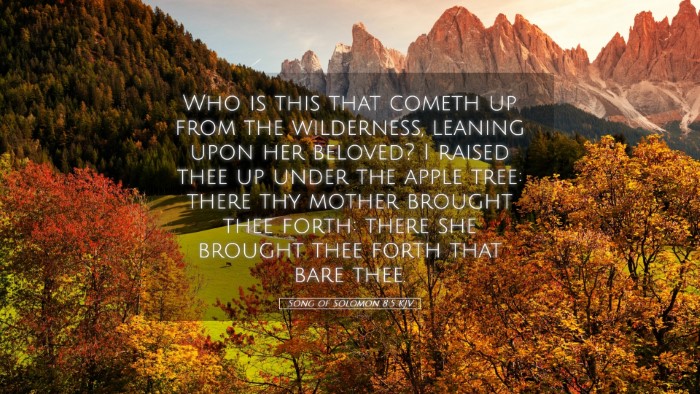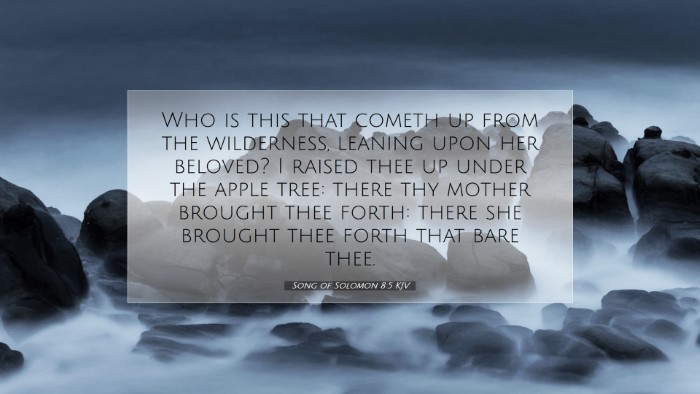Old Testament
Genesis Exodus Leviticus Numbers Deuteronomy Joshua Judges Ruth 1 Samuel 2 Samuel 1 Kings 2 Kings 1 Chronicles 2 Chronicles Ezra Nehemiah Esther Job Psalms Proverbs Ecclesiastes Song of Solomon Isaiah Jeremiah Lamentations Ezekiel Daniel Hosea Joel Amos Obadiah Jonah Micah Nahum Habakkuk Zephaniah Haggai Zechariah MalachiSong of Solomon 8:5
Song of Solomon 8:5 KJV
Who is this that cometh up from the wilderness, leaning upon her beloved? I raised thee up under the apple tree: there thy mother brought thee forth: there she brought thee forth that bare thee.
Song of Solomon 8:5 Bible Commentary
Commentary on Song of Solomon 8:5
Verse Context: "Who is this that cometh up from the wilderness, leaning upon her beloved? I raised thee up under the apple tree: there thy mother brought thee forth: there she brought thee forth that bare thee."
Introduction
The Song of Solomon, often referred to as the Song of Songs, is a unique and highly poetic book of the Bible attributed to Solomon. It is celebrated for its rich love imagery and its depiction of romantic and divine love. In Song of Solomon 8:5, we encounter a question posed about a figure emerging from the wilderness, which triggers profound themes of love, yearning, and identity.
Insights from Public Domain Commentaries
Matthew Henry's Commentary
Matthew Henry emphasizes the symbolic implications of "the wilderness." He interprets this wilderness as a place of trials and separation but also where personal growth and deepening love can flourish. The beloved's leaning upon her partner signifies intimacy and reliance, reflecting a deep emotional connection.
- Wilderness As Metaphor: Henry suggests the wilderness is a metaphor for the struggles one faces in life. Emerging from this wilderness indicates victory over those trials.
- Intimacy and Trust: The act of leaning upon the beloved symbolizes a relationship grounded in trust and support; it reflects the beauty of mutual dependence in love.
- Parental Connection: The mention of the apple tree invokes the memory of motherhood and nurturing, reminding readers of the importance of familial roots in the formation of romantic love.
Albert Barnes' Notes on the Bible
Albert Barnes focuses on the identity of the woman. He interprets the phrase "Who is this" as an inquiry into the character and status of the individual emerging from obscurity into the brightness of love’s promise. This reflects the transformative power of love and redemption.
- Emphasis on Transformation: Barnes points to the idea that the woman, once hidden or vulnerable, is now confidently presented in the light of her relationship with her beloved.
- Symbolism of the Apple Tree: He notes the apple tree as a symbol of love’s sweetness and affection, suggesting that astonishing moments of love often stem from foundational life experiences.
- Community Recognition: The question posed by the observers emphasizes the communal aspect of love; it is not just a private affair but one that evokes interest and recognition from others.
Adam Clarke's Commentary
Adam Clarke elaborates on the implications of the wilderness and the apple tree as sacred symbols. He suggests that the wilderness represents spiritual trials, while the apple tree symbolizes the place of comfort, nourishment, and deep affection.
- Spiritual Journey: Clarke sees the woman’s emergence from the wilderness as indicative of a spiritual journey, emphasizing that every believer transcends personal trials through faith.
- Roots of Affection: The allusion to the apple tree is interpreted as a reference to love that is rooted deep in familial bonds, indicating that the woman's love for her partner is profound and well-founded.
- Affirmation of Identity: Clarke highlights the importance of recognizing oneself through relationships, portraying love as a medium that brings about self-discovery.
Theological Reflections
The theological implications of this passage are rich and manifold. Scholars and students may extract lessons about the nature of divine love as mirrored in human relationships. Here are several insights:
- The Nature of Love: The passage encapsulates the essence of love as both a journey and a destination, grounded in mutual support and recognition.
- Symbolism of Wilderness: The wilderness also serves as a picture of spiritual barrenness that contrasts with the flourishing love that follows; thus, believers are encouraged to seek love as a divine restorative force.
- Importance of Heritage: In recognizing one's origins and experiences under the 'apple tree,' the text reminds us that love often emerges from personal histories, influencing how relationships are formed and nurtured.
Conclusion
Song of Solomon 8:5 invites readers to reflect on the profound journey of love, highlighting the transitions from solitude and wilderness to companionship and intimacy. The care taken by Hebrew poetry in portraying these themes underscores love's complexity and beauty. Pastors and theologians may find in this verse not just poetic inspiration but also a guide for understanding the divine principles governing relationships.


